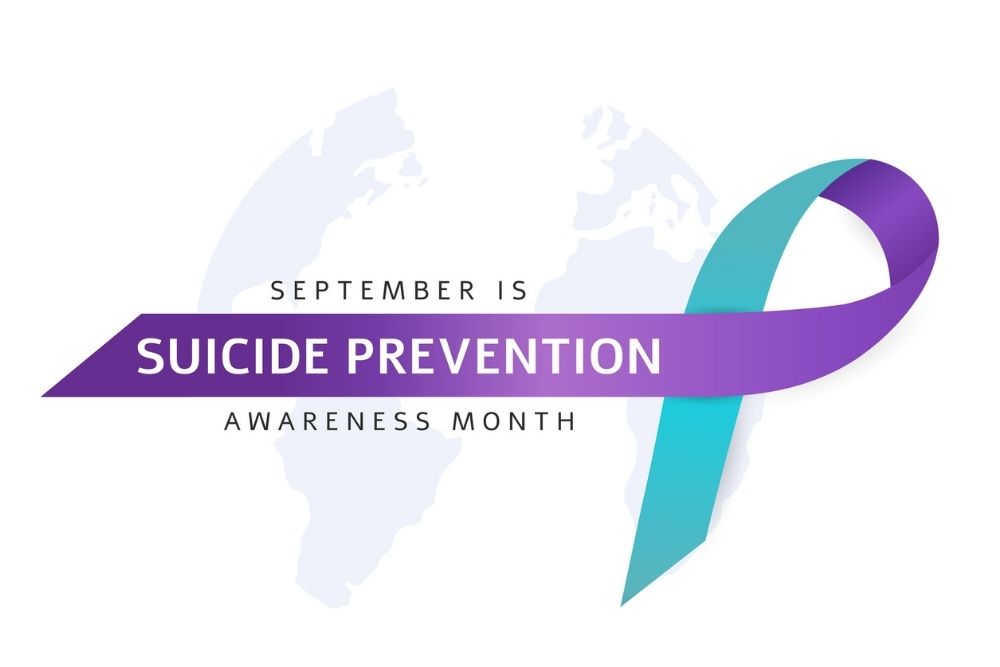It’s a shocking statistic. The suicide rate in Iowa has increased more than 70% in the past 20 years—much more than “the 30.3% increase seen in the United States during that same period,” according to USAFacts. The Centers for Disease Control and Prevention (CDC) indicates that many factors contribute to suicide ideation and attempts, including “individual, relationship, community, and societal levels.”
However, with the help of Suicide Prevention Awareness Month, we can work together to help people find help—and hope. This annual effort by the Substance Abuse and Mental Health Services Administration (SAMHSA) is designed to communicate “the warning signs for suicide, encouraging open conversations about mental health, and connecting people to proven treatment and resources.”
Why Is There a Need for Suicide Prevention Awareness?
When someone struggles with suicidal thoughts, the question many ask is: Why? While there’s no single answer, suicide risk often arises from a combination of contributing factors. Let’s take a closer look.
Mental Illness: More Than Just a Diagnosis
These illnesses don’t just affect mood or behavior—they can distort how a person sees themselves, their future, and their options. Common conditions linked to suicidal thoughts include:
- Depression, often marked by feelings of worthlessness and deep despair.
- Anxiety disorders, which can create an overwhelming sense of panic or fear.
- Bipolar disorder, characterized by intense mood swings that can include suicidal lows.
- Schizophrenia, which can impair perception of reality and increase vulnerability.
When Substance Use Adds Fuel to the Fire
Alcohol and drugs don’t just mask distress—they can amplify impulsivity and despair. Key risks include:
- Impaired judgment, which can lead to unplanned attempts.
- Intensified emotional pain during or after use.
- Withdrawal symptoms, which can increase anxiety and hopelessness.
Trauma’s Lingering Echo
Unresolved trauma has a long reach. For many, adverse childhood experiences, PTSD, complicated grief, and other issues create emotional wounds that never fully heal without support. Ongoing emotional distress from trauma can:
- Create chronic feelings of fear or shame
- Disrupt healthy coping mechanisms
- Lead to dissociation or detachment from life
Life’s Breaking Points
Sometimes, it’s not one major illness or trauma—but a series of overwhelming life events—that leads someone to the edge. According to both SAMHSA and the CDC, situational stressors play a major role in suicide risk. Triggers include:
- Death of a loved one
- Financial hardship or job loss
- Relationship breakdowns or divorce
Additionally, certain populations, such as Veterans, members of the LGBTQIA+2s community, or anyone facing bullying, isolation, or a cultural stigma about mental health issues, experience unique challenges that threaten to overwhelm their coping skills.
How Suicide Prevention Awareness Month Can Help
SAMSHA uses this effort as a powerful reminder that we hold real influence in one another’s lives—not by grand gestures, but through kindness, understanding, and awareness. Drawing from its digital toolkit, the campaign offers tools and insight to help individuals, organizations, and communities spark conversations that can save lives. Here are the actions implemented September 1–30th:
- Week 1: Understanding Risk: Embracing Treatment, Hope, and Resilience
This week highlights the importance of recognizing key warning signs of suicidal consideration, removing stigma around seeking help, and promoting proven treatment options. - Week 2: Building Community Partnerships and Supports
The effort centers on the power of community—schools, workplaces, peer groups, and local organizations—to create safe, inclusive spaces. - Week 3: Improving Care and Outcomes for People at Risk
This week emphasizes the need for systems that make it easier to access mental health services, develop personalized safety plans, and provide consistent follow-up. - Week 4: Promoting Dignity Through Connection
During this final week, the goal is to listen to and elevate the voices of people who have faced suicidal thoughts or survived attempts. Their lived experiences help break down stigma, foster empathy, and remind us that simply showing up for someone—through a call, message, or open conversation—is profoundly life-affirming.
Hotlines for Immediate Assistance
If you or someone you love is struggling, find the help you need through these free and confidential resources:
- 988 Suicide and Crisis Lifeline: Available to everyone 24/7. Call or text 988, or use the online chat function.
- Copline: Available to current and former law enforcement personnel and their families 24/7. Call 1-800-COPLINE (267-5463).
- Fire/EMS Helpline: Available to firefighters, EMTs, rescue personnel, and their families 24/7. Call 1-888-731-FIRE (3473).
- LGBT National Hotline: Available to all members of the LGBTQIA+2s community, including youth, adults, and seniors, Monday–Saturday during specific hours. Call 888-843-4564 for the primary hotline or visit the website for other options.
- NAMI Helpline. Available to everyone in need of one-on-one emotional support, mental health information, and resources needed to tackle tough challenges, Monday–Friday 10:00 a.m.–10:00 p.m. EST. Call 1-800-950-NAMI (6264) or text ‘NAMI’ to 62640.
- National Domestic Violence Hotline: Available to everyone 24/7. Call 1-800-799-SAFE (7233), or text ‘START’ to 88788, or use the online chat function.
- RAINN National Sexual Assault Hotline: Available to everyone 24/7. Call 800-656-HOPE (4673), or text ‘HOPE’ to 64673, or use the online chat function.
- The Trevor Project Crisis Line: Available to LGBTQIA+2s youth 24/7. Call 1-866-488-7386, or text ‘START’ to 678-678, or use the online chat function.
- Veterans Crisis Line: Available to Veterans and their loved ones 24/7. Call 988, then press 1, or text 838255, or use the online chat function. You don’t have to be enrolled in VA benefits or health care to connect with caring, qualified responders.
Your Life Iowa, a program of the Iowa Department of Health and Human Services, offers more critical resources.
Choose Additional Care From Ivory Plains
Our inclusive addiction rehabilitation program in Adair, Iowa, utilizes evidence-based quality care to address the root causes of your concerns and provide you with a path of healing and hope. Why? Because you matter. Ask our admissions team how our board-certified professionals show up for you.





